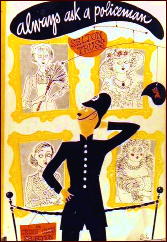Thu 9 Sep 2010
Reviewed by William F. Deeck: SELDON TRUSS – Always Ask a Policeman.
Posted by Steve under Reviews[8] Comments
William F. Deeck
SELDON TRUSS – Always Ask a Policeman. Doubleday Crime Club, hardcover, 1952. Hodder & Stoughton, UK, hardcover, 1953.

What does Goodge’s dreadful lodging house have to do with the pompous Cosmo Almond, soon to be candidate for Member of Parliament? It harbors, if that’s the word I want, the ineffable Miss Dysart, who is in love with Romance, finds invisible bugs on her clothing, and may or may not be threatening Cosmo’s life, such as it is.
The lodging house also contains Miss Pym — no, not our Miss Pym; this one is a clergyman’s daughter who poses nude at a dubious art studio patronized by Cosmo’s male secretary — an odd medical student who keeps getting picked up by the police to “assist their inquiries,” and the loathsome Goodge himself.
Since Miss Dysart has appealed to the Yard to find Cosmo, Inspector Gidleigh of Scotland Yard — who talks like John Appleby but without the wit — is keeping an eye on this situation. Mr. Horace of the well-read but not respected Daily Snapshot both helps and hinders the investigation. But what and who are being investigated?
Certain aspects of the novel will be clear to the experienced mystery reader, but this is still an engrossing investigation. If only all the characters had not spoken as though they had been educated at Oxford…
Bibliographic Data: Inspector Gidleigh appeared in 24 of the author’s detective novels, published over a period of time ranging from 1936 to 1965. Truss’s full list of mystery fiction appeared between 1928 and 1969, well over 40 years, approximately 45 novels, including three as by George Selmark, but he’s almost assuredly unknown to any but the most serious collector today.
September 9th, 2010 at 10:10 pm
Truss was a good writer, well worth seeking out. He tended to more produce more loosely plotted books than the classic detective novelists (his thirties books are quite in the Edgar Wallace mold), but his books have appeal.
September 9th, 2010 at 10:35 pm
From the late 40s on, many of his books were published in the US by Doubleday and their Crime Club imprint. So I have most of those, but I don’t believe I’ve read any of them.
There were a lot of British detective novels published around that time, usually with Scotland Yard inspectors, and for me, they all seemed to blend together.
Posting Bill Deeck’s reviews on this blog has one huge side effect — creating whole lists of authors and books to read that I never have before. This is good, I think, but it’s also frustrating!
I’m not surprised to learn that Truss’s earlier books were thrillers, perhaps, more than detective stories, a fact which does not surprise me. I don’t have any these, the ones from the 20s through the mid-1940s. Add more to the want list…
September 9th, 2010 at 11:47 pm
Coincidentally, I read three of his thirties books over this summer and was planning to review for this site. I’m getting a real backlog here!
Anthony Boucher was pretty favorable to Truss’ books. He had a better publication record in the U.S. after WW2 than before for some reason.
His thrillers are vastly superior to, say, Sydney Horler’s, for example. He was a better writer (not hard). I personally wish he had adhered more to pure detection, but I still enjoy his books.
September 10th, 2010 at 12:28 am
Truss is fun to read in the Edgar Wallace mode, and certainly could write, but John Appleby without the wit — ouch. That sounds pretty painful actually.
Haven’t read this one, but I’ll be on the lookout for it. Truss was one of those reliable writers of the era that almost made comptence and a bit of skill look like art (minor anyway).
Love that cover.
September 10th, 2010 at 12:40 am
British hoity-toity in the mystery genre has its pluses and minuses. I recall that P. D. James has an eighteen year old male in her 1980 novel Innocent Blood who speaks like he was raised in a Noel Coward drawing room. It’s hard enough to believe those characters in 1930, let alone half a century later, especially when they are close to my own birth year! Of course, I do believe the lad was going to attend Oxford.
September 10th, 2010 at 1:11 am
Oh, yes, all those American Truss covers from that period are like that–whimsical British. The books all have that horrifically cheap paper characteristic of Doubleday in those years as well, unfortunately!
September 10th, 2010 at 1:20 am
Curt, Getting back to comment #3, I’m already looking forward to those Truss reviews. Don’t know how many others are interested (other than we three), but since the guy in charge is me, and I am — interested, that is — then by all means, send them along, whenever you can.
— Steve
September 10th, 2010 at 1:44 am
Re that hoity toity accent, the funny thing is that I seldom heard it at Oxford. The Oxbridge thing was common enough (one student wag called it “the voice of the Beeb”), but that snooty faintly snide accent wasn’t around much, as you’ll notice if you watch reruns of MORSE or the current LEWIS series.
Of course it existed, but I suspect much of it was performance even then.
And Truss, Carolyn Wells or whomever, I’m always interested in Curt’s reviews — especially from this period. I really look forward to that book he is working on.